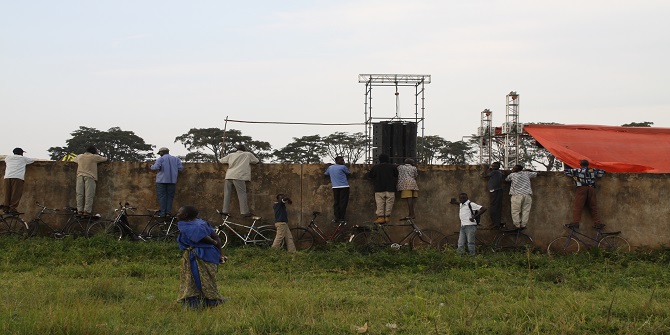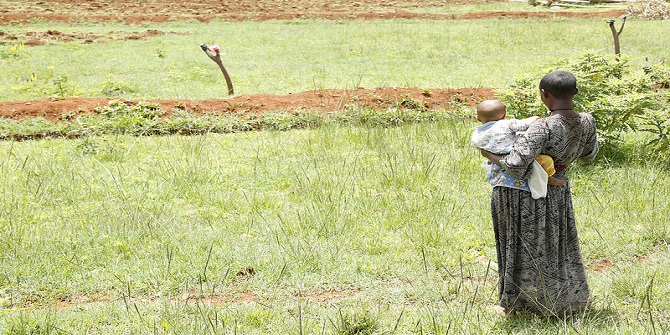Marija Babović and Danilo Vuković overview their recent study of a social accountability programme in Cambodia. They argue future initiatives ought to be grounded in and tailored around citizens’ real interests, taking into account the country’s restrictive patronage based political environment as one of the key variables.
During October and November several protests related to land disputes have taken place in the Cambodian capital Phnom Penh. Residents have demonstrated against land evictions which are a consequence of the city’s fast but often irregular – or at least not sufficiently socially responsible – urbanization. At the same time, villagers from Preah Vihear province have called for a resolution to their land dispute with a ruling party lawmaker whom they accuse of using armed force to destroy 253 houses, pagodas and schools. Sometimes, in their search for justice, these protesters have experienced violence at the hands of police forces and district security guards.
These are examples of social accountability practices. Social accountability activities are undertaken by citizens, their associations, movements and media that aim to hold political authorities accountable to wider society. These actions vary, from budget monitoring, performance monitoring, naming and blaming, to public demonstrations and lawsuits. In our examples, social accountability actions evolve around burning issues of access to land and other resources which are of key importance for the livelihoods of people in urban and rural settlements.
During 2009-2013 The Asian Foundation implemented a project aimed at promoting social accountability in Cambodia. The project was developed around a ‘theory of change’ which included several key explicit assumptions:
- Increasing the capacities of civil society organizations (CSOs) will enable a more proactive engagement in social accountability actions;
- supporting joint social accountability practices of CSOs and local authorities will enhance the capacities of local authorities for social accountability;
- supporting CSOs to enhance the capacities of citizens will increase citizen participation in social accountability practices;
- supporting CSOs to perform social accountability actions in partnership with state institutions will contribute to good governance.
- In a restrictive political environment it is more feasible to promote social accountability at the local level and to focus on non-confrontational forms of social accountability; and
- social accountability leads to the gradual introduction of political accountability.
For a recent JSRP study, this theory of change was examined against reality in two streams of project implementation: quality of education and natural resource management in fishing communities.
First, we explored the possibility of making big steps forward in developing social accountability within such a limited time and action frame. Our analysis indicated some modest but important improvements, but also some important limits and obstacles to the promotion of social accountability which should be taken into account in future interventions:
- Citizens activate when there are burning issues at stake. Civic engagement remained modest except when their livelihoods were put in danger due to land grabbing. When it came to “soft” issues, such as the quality of education, citizens were not so active.
- Burning issues lead to political activism, otherwise it’s only policy. When burning issues are at stake, political activism emerges. Otherwise, citizens and CSOs are more engaged in technical and organizational matters, dealing more with policy issues (procedures, trainings, capacities etc.) than with political activism.
- Citizens protest, but also provide services instead of the state. Another form of civic activism is better self-organization to provide services in the absence of appropriate public services. This was the case when citizens in Koh Kong province organized themselves to protect fishery resources. They did it by preserving their ecological balance (planting mangrove trees) or by providing security to fishermen and protecting the environment from illegal fishing.
- Marginal improvements of capacities of local administration for social accountability. The weakness of civil society combined with the relative strong position of government, in some instances, led to control over CSOs (particularly smaller community based organizations) by the latter. At the same time, evidence was not found of any improvements in good governance after the project’s end.
Lessons learned from this exercise indicate that any future attempts to promote social accountability and increase engagement of citizens should take a diversified approach to different groups of citizens. This means that interventions ought to be tailored around their position, interests, potentials and limits to action.
In addition to this, the restrictive political environment with pervasive patronage networks and high level of corruption should be taken as a key variable. Such an environment limits all efforts invested in citizen activation within local communities. Therefore, alternative models should be explored and tested, such as the dual empowerment of citizens for action at both local and central levels, combined with their empowerment through economic participation and human resource development that can increase their capacities for social accountability.
Finally, a theory of change that serves as a basis for designing projects related to the promotion of social accountability should be more dynamic, specifying short, mid and long-term objectives, and framing the intervention more in its time dimension.
Photo credit: United Nations Photo via Foter.com / CC BY-NC-ND
Note: articles present the views of their authors, and not necessarily the position of the Justice and Security Research Programme, nor of the London School of Economics and Political Science.




